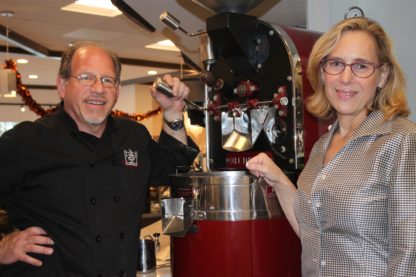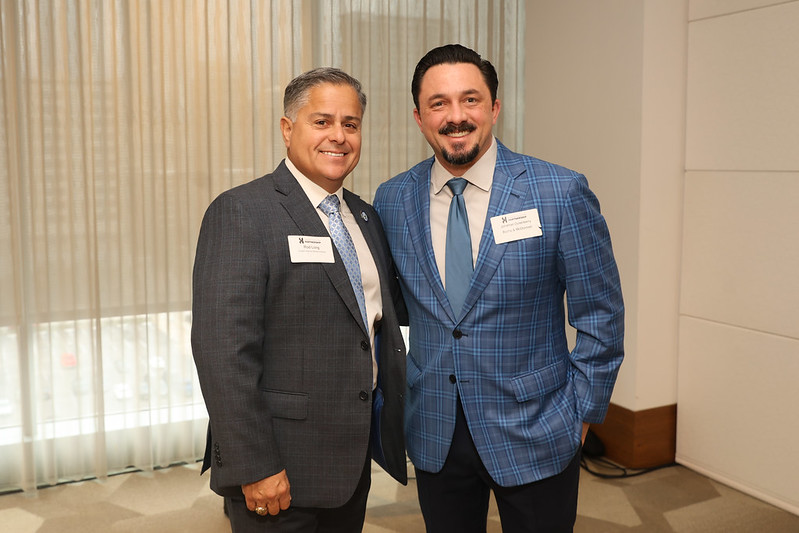Small Business Perspective: Business Continuity During Crisis
Published May 26, 2020 by Julia McGowen
The novel coronavirus is unlike any disaster, natural or economic, that we have seen in modern times. Small, local businesses have been particularly impacted by the pandemic but are not unfamiliar with dealing with crisis as many are still recovering from Hurricane Harvey, Imelda, and the Memorial Day floods.
One Houston business has withstood many natural disasters, becoming truly illustrative of a resilient business. Three Brothers Bakery opened their first Houston store in May of 1949, but the family has been in the baking business since 1825. Today, the bakery operates three locations across the city.
Janice Jucker, the long-time small business owner, and President of Three Brothers Bakery, participated in a Q&A to share insights into what small businesses can/should do before, during and after crisis hits to support business continuity.
Three Brothers Bakery is a Houston institution and has been in the community almost a century. What do you believe is an important factor in the business’ resiliency?
We stand on the legacy of survivorship, as the three brothers, with their older sister, survived the Holocaust, as well as my husband, Bobby’s, mother. I think a drive to survive guides us. From four floods, fire, hurricane and now pandemic we have learned the formula for small business resiliency.
How is Three Brothers Bakery staying nimble and coming up with new, creative ideas to sell products amidst the changing circumstances?
We have come up with several new ideas and outlets to sell our products. So far, a couple have been:
- Buy 1 Pie/Employ a Village: Every purchase of a pie employs many people both at the bakery and at their supporting vendors. Three Brothers Bakery has challenged the community to support all these businesses with the simple act of buying a pie. Your purchase would allow Three Brothers Bakery the ability to hire as opposed to just trying to survive. See how many are involved in the making of their award-winning southern pecan pie here.
- Mitzvah Funds: A principle we hold dear is that of doing a mitzvah–a good deed. This program allows individuals to make donations to a selection of charities providing food for those in need or showing appreciation to everyone helping make sure we are safe and keeps our Three Brothers Bakery team members working, improves the local economy. After we started receiving donations to the program, we realized that this disaster was different. Since people are not physically impacted with their homes destroyed, those that still have income coming in wanted to help and felt this was a way to help us and to help those in need. We were scrambling to find places to donate the baked goods based on the categories they requested at first, so we decided to formalize a program and called it the Mitzvah Funds. The funds also allow us to give back by treating the baked good recipients as wholesale accounts, which means they get a 15% discount off retail. On top of these baked goods, we still feed the homeless and hungry with our day-old goods, which we’ve done since the beginning of the bakery, 71 years ago. More information can be found here.
The response to these programs has been wonderful – but it has been so much more – the pies, the mitzvah funds, people sending little surprise treats to clients. Since March 26, we have seen a 167.5% year over year change in pie sales.
How are you adapting to the phased reopening of local businesses?
We have been open the whole time. Sanitation was already something we did in the normal course of business, so we have increased frequency. We are doing temperature checks upon arrival to work and screening questions, all wearing masks now, and we were already wearing gloves prior to COVID but are now just wearing them through the complete transaction process to checkout. We are also taking more preorders and offer customers to call upon arrival and have their orders brought to them in their car. In many ways, our model is similar to that of a grocery store – people come in, see what they want, and we are able to box and bag it for them. Additionally, we have set up spacing lines and only service enough customers to keep everyone distant from one another.
What advice would you share with small businesses to help navigate times of uncertainty and prepare for future disaster?
- Your people are MOST important
- Communication with both your team and customers is vital. Be sure your team’s needs are met. You need your teams to remain opening and operating
- Be prepared to take care of your team by keeping cash in the bank to cover, ideally three months of payroll if possible. If three months causes strain, try for at least one month of payroll. I cannot stress enough how paying your team is the most important thing we do as small business owners.
- Understand Your Money
- Learn the language of business, which is finance. Keeping finances up to date, reviewing them regularly and keeping your credit score strong is critical to business continuity. In addition to your current financials, also consider your short and long-term financial standing. Thorough understanding of your financials is key to recovering from any disaster.
- Having a good accountant, one that is more than someone who just does your taxes is also recommended.
- Insurance monies are also important – read your insurance policy, read your insurance policy, read your insurance policy, and make sure you have the best coverage you can afford with the lowest deductibles, so make sure you have a good agent who can put together the best package of underwriters based on the category of need.
- Assess your Assets
- Take stock of the physical assets needed to run your business and fix or replace what is needed and have a plan on how to do so before the disaster, if possible.
- Consider your procurement process, i.e., if it flooded do you still want to buy new equipment in the city that flooded – you may need to travel to be sure you get stable equipment and vehicles.
- Your voice is an asset and is heard by joining trade associations, of which the Greater Houston Partnership is one of ours, who advocate for you on local, state, and federal levels. Also KNOW your lawmakers at all levels of government and be in contact with them before you need them by being a resource as an individual business owner.
- One thing my husband and I are advocating for in the next Texas legislative session is to pass the availability of Emergency Bridge Loans for small businesses after natural disasters activated by the Governor modeled after Florida’s program. With those funds in place, small businesses have a critical tool to supply quick cash to pay their teams and maintain operations. I think this pandemic has shown the need for this legislation.
- Cleaning up and Returning to Operations
- Clear communication about reopening plans should be shared with both your team and customers. Keep everyone informed about your operations as they change or expand.
- Innovation is also vital to the four-part recovery plan. You must be able to adapt as disasters hit and situations change.
- Marketing – how can you stay front of mind with your customers – don’t ignore this very important tool in your toolbox.
Every disaster is different, and I learn something from each one, which makes us get better at surviving the next one. You’ve learned something from this pandemic – figure out what it is and know how to make it better next time. I always say out of everything bad comes something good, but sometimes you just need to search for it.
Visit the Partnership's Work Safe page for industry-specific resources and information about reopening safely. For additional small business news, tips and resources, click here.
 The Houston Report
The Houston Report




















